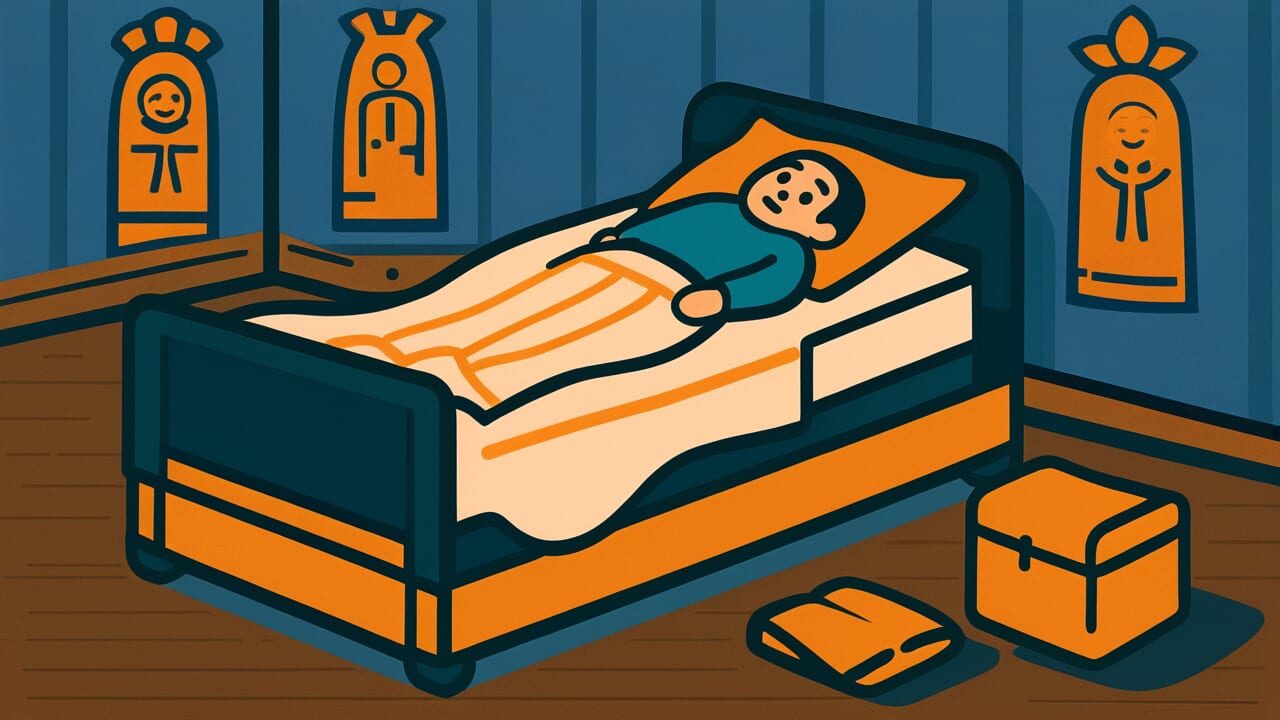How to Read “Bed is the poor man’s opera”
Bed is the poor man’s opera
[BED iz thuh POOR manz AH-per-uh]
Meaning of “Bed is the poor man’s opera”
Simply put, this proverb means that sleep offers the same joy and escape to poor people that expensive entertainment gives to the wealthy.
The literal words compare two very different things. A bed represents rest and dreams. An opera represents costly entertainment and cultural refinement. The proverb suggests that both serve the same basic human need for pleasure and escape from daily troubles.
We use this saying to recognize that happiness doesn’t always cost money. When someone works hard all day for little pay, their bed becomes precious. Sleep offers dreams, peace, and relief from worry. Rich people might spend hundreds on theater tickets, but poor people find similar joy in rest.
This wisdom reminds us that simple pleasures can be deeply satisfying. It also shows respect for people who find contentment in basic things. The proverb doesn’t pity the poor person. Instead, it celebrates their ability to find richness in something everyone can access.
Origin and Etymology
The exact origin of this proverb is unknown, though it appears in various forms across European languages. Early versions can be traced to folk wisdom from agricultural societies. These communities understood that working people needed affordable sources of comfort and renewal.
During centuries when most people lived in poverty, entertainment was expensive and rare. Opera houses served the wealthy while common people worked long hours for basic survival. Sleep became one of the few reliable escapes from hardship and physical exhaustion.
The saying spread through oral tradition before appearing in written collections of proverbs. It reflected a time when class differences were stark and obvious. The comparison between beds and opera highlighted how different social classes found pleasure in completely different ways.
Interesting Facts
The word “opera” comes from Italian, meaning “work” or “labor,” which creates an interesting contrast with the restful nature of sleep. This proverb uses a literary device called juxtaposition, placing two opposite concepts together to create meaning. Similar sayings exist in other languages, suggesting this observation about class and comfort appears across many cultures.
Usage Examples
- Roommate to roommate: “You complain about being broke but sleep until noon every day – Bed is the poor man’s opera.”
- Parent to spouse: “He dreams of success but won’t get up to look for work – Bed is the poor man’s opera.”
Universal Wisdom
This proverb reveals a fundamental truth about human adaptability and the democracy of dreams. Throughout history, people have discovered that satisfaction doesn’t require wealth or status. The human mind naturally seeks pleasure and escape, and it will find these experiences wherever they exist.
The saying exposes something deeper about social inequality and resilience. While external circumstances divide people into rich and poor, internal experiences remain surprisingly similar. Both wealthy opera-goers and exhausted workers seek the same things: beauty, escape, and emotional renewal. The proverb suggests that nature provides everyone with at least one reliable source of these experiences.
This wisdom also reveals how humans create meaning from necessity. When expensive pleasures remain out of reach, people don’t simply suffer. They discover richness in available experiences. Sleep becomes more than rest; it becomes entertainment, therapy, and adventure. Dreams offer stories more personal than any performance. This transformation of necessity into pleasure represents one of humanity’s most remarkable survival skills.
When AI Hears This
Poor people become secret traders of their own awareness. They sell painful present moments to buy peaceful sleep instead. This isn’t just rest – it’s smart emotional economics. When you can’t afford movies or concerts, you invest in dreams. Sleep becomes a calculated escape from reality’s harsh demands.
This reveals humans as natural time merchants without realizing it. Rich people buy entertainment to fill empty hours with pleasure. Poor people do the opposite – they empty painful hours entirely. Both groups seek the same goal through mirror strategies. Consciousness becomes currency that gets spent or saved strategically.
What fascinates me is how elegant this unconscious system works. Humans automatically develop sophisticated coping mechanisms when resources disappear. Sleep transforms from basic need into luxury entertainment venue. The poor essentially hack their own minds for free happiness. This shows remarkable mental flexibility hiding behind simple human behavior.
Lessons for Today
Living with this wisdom means recognizing that contentment often comes from appreciating what we already have rather than acquiring what we lack. The proverb teaches us to find richness in simple experiences that might otherwise seem ordinary or insufficient.
In relationships and communities, this understanding helps us respect different sources of joy and fulfillment. Not everyone needs expensive entertainment or luxury goods to feel satisfied. Some people genuinely find deep pleasure in quiet moments, rest, and simple comforts. Recognizing this prevents us from judging others’ choices or assuming everyone wants the same things.
The broader lesson challenges our assumptions about what makes life worth living. While ambition and improvement matter, this wisdom reminds us that happiness doesn’t always require more money or higher status. Sometimes the most reliable pleasures are the ones already within reach. This doesn’t mean accepting unfair conditions, but rather finding strength and joy even in difficult circumstances. The proverb offers both comfort for those with little and perspective for those with much.



Comments